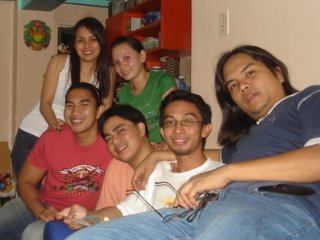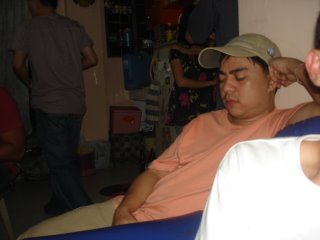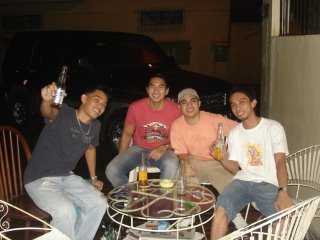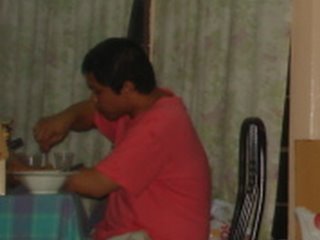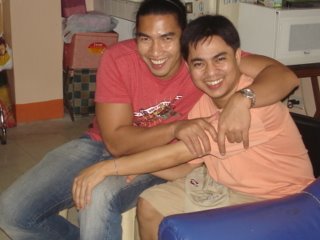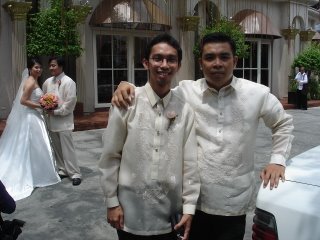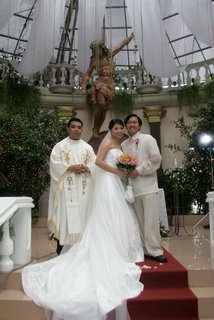Friday, December 08, 2006
SANO eGroup
One of our fellow sanos created an eGroup. Try to visit the site here. The intention was to make way for collecting exclusive sano words which they coined "Sanosaurus". Igwa baya kita sin mga nahimo sadto? "juego!!"
Wednesday, November 22, 2006
knicks vs rockets

Thought this might interest you. I ,with some of my friends, watched an NBA game ,NY knicks vs. rockets, last monday at madison square garden. It was confirmed that Yao Ming is really taller than me in person..haha. Though it was expected the rockets would win, we still stayed 'till the end of the game. ( rockets- 97; knicks 90)



Tuesday, October 17, 2006
Tuesday, October 03, 2006
Tuesday, September 12, 2006
the early birds....
Bring Back the Broke Back and other scandals
Happy Birthday Canor!

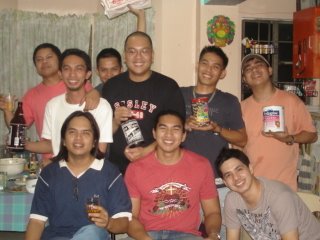
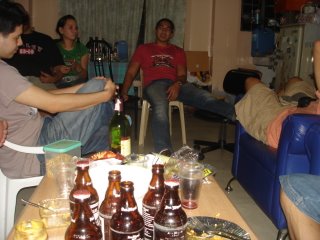 Though most of us were late and the streets of Manila were transforming into a smelly Venice, we managed to start the session at least midnight of 9th Sept 2006 at Raymond Barba's place. We were supposed to meet at Aldin's res 7:30pm. What do you expect? kaya after we finished one case of San Mig Light ( Nicols, Aldin, Roy and Joe) rotoy na. At Canor's Place , Aldin was the facilitator and Nicols naman pasingit singit with his seminary experiences with tiyo obid etc. hehe.. and of course Anlord's escapades in Davao were never out of topic. It was a great night and as usual we talked about Ms M. and rest of the treachers . We planned about the coming olps anniversary. We are going to meet again. I guess on the 27th of Sept 2006. Thanks to Aldin and Happy birthday to Canor..naubos ni wendell an pansit.. and to the guard who went up to tell us we were too loud.. we are coming back!
Though most of us were late and the streets of Manila were transforming into a smelly Venice, we managed to start the session at least midnight of 9th Sept 2006 at Raymond Barba's place. We were supposed to meet at Aldin's res 7:30pm. What do you expect? kaya after we finished one case of San Mig Light ( Nicols, Aldin, Roy and Joe) rotoy na. At Canor's Place , Aldin was the facilitator and Nicols naman pasingit singit with his seminary experiences with tiyo obid etc. hehe.. and of course Anlord's escapades in Davao were never out of topic. It was a great night and as usual we talked about Ms M. and rest of the treachers . We planned about the coming olps anniversary. We are going to meet again. I guess on the 27th of Sept 2006. Thanks to Aldin and Happy birthday to Canor..naubos ni wendell an pansit.. and to the guard who went up to tell us we were too loud.. we are coming back!
Tuesday, August 29, 2006
Naked runners, school wars and breed of destabilizers
Gonzalez: UP breeds destabilizers, naked runners
By Armand NocumInquirerLast updated 02:25am (Mla time) 08/27/2006
Published on page A5 of the August 27, 2006 issue of the Philippine Daily Inquirer
THIS time Justice Secretary Raul Gonzalez has picked on the University of the Philippines school system, saying it mainly produces militant protesters and fraternity men and women who run around the campus naked.
“That school breeds the destabilizers that haunt the country year after year. They are acting as if they are the only ones who know how to run the country,” Gonzalez told the Inquirer yesterday.He made it clear, however, that he was not assailing the entire university population because “there are many students there who are bright and good.”Interviewed by phone while he was with President Macapagal-Arroyo in Guimaras, Gonzalez pointed to the Oblation run of the APO fraternity as another indication of the kind of students that came from UP.
“I doff my hat to them because they initiate the running of naked people... That’s also one kind of culture that they develop there,” he said, noting that women had begun to join the naked run as well which is held in December.
“Maybe we are going in that direction... there are now women running naked. I will not be surprised if they will go to school with only their books, nothing more,” he said.Gonzalez made the statements while lamenting that UP was the site of numerous protest rallies and symposia calling for the resignation of President Arroyo.
“In every storm that takes place, UP students are in the forefront,” he said. “As a matter of fact, our history will show that since the martial law years, students from UP were the ones who went underground and fought the government. In fact, many of them went to China and never came back.”
Bomb-making in labs
Gonzalez said he came to see the militant activism of UP students first-hand during the First Quarter Storm of 1970 when then Sen. Genaro Magsaysay formed a panel to look into the violent protests there and he saw pillbox bombs being assembled in the school laboratories.He said this was not the way the students should repay the government for giving them a world-class education.
“They should consider the fact that the state is the one paying for their schooling. Why fight the state? Why try to bring it down. I think some degree of gratitude should be there also,” he said.He noted that UP had always been known as a “cradle of leadership” but he was worried that with the way some students there were acting, some serious questions would be raised about the “kind of leaders we will have in the future.”
But he said he was “not degrading UP per se,” but was only questioning the kind of students that came from it.
‘I am well-behaved’He said the matter of the high “tolerance to education freedom” should be raised to UP officials and teachers during the annual budget hearing for the school.Asked what school he graduated from, Gonzalez replied: “University of Sto. Tomas... that’s why I am well-behaved.”
Gonzalez is known for speaking his mind on most issues and creating controversy.
Earlier, when he was asked if he was going to arrest the widow of the late presidential candidate Fernando Poe Jr. for inciting to sedition when she spoke out against President Arroyo, he said she was too pretty to be arrested.
Another time when it was revealed that he was undergoing dialysis for kidney stones, he said that was not what made him launch verbal tirades against critics of Ms Arroyo.
“What does [having the] balls [to say things] got to do with that?” he said when he was asked if the painful passing of stones in his urine was the reason he was grouchy to critics and media people.
By Armand NocumInquirerLast updated 02:25am (Mla time) 08/27/2006
Published on page A5 of the August 27, 2006 issue of the Philippine Daily Inquirer
THIS time Justice Secretary Raul Gonzalez has picked on the University of the Philippines school system, saying it mainly produces militant protesters and fraternity men and women who run around the campus naked.
“That school breeds the destabilizers that haunt the country year after year. They are acting as if they are the only ones who know how to run the country,” Gonzalez told the Inquirer yesterday.He made it clear, however, that he was not assailing the entire university population because “there are many students there who are bright and good.”Interviewed by phone while he was with President Macapagal-Arroyo in Guimaras, Gonzalez pointed to the Oblation run of the APO fraternity as another indication of the kind of students that came from UP.
“I doff my hat to them because they initiate the running of naked people... That’s also one kind of culture that they develop there,” he said, noting that women had begun to join the naked run as well which is held in December.
“Maybe we are going in that direction... there are now women running naked. I will not be surprised if they will go to school with only their books, nothing more,” he said.Gonzalez made the statements while lamenting that UP was the site of numerous protest rallies and symposia calling for the resignation of President Arroyo.
“In every storm that takes place, UP students are in the forefront,” he said. “As a matter of fact, our history will show that since the martial law years, students from UP were the ones who went underground and fought the government. In fact, many of them went to China and never came back.”
Bomb-making in labs
Gonzalez said he came to see the militant activism of UP students first-hand during the First Quarter Storm of 1970 when then Sen. Genaro Magsaysay formed a panel to look into the violent protests there and he saw pillbox bombs being assembled in the school laboratories.He said this was not the way the students should repay the government for giving them a world-class education.
“They should consider the fact that the state is the one paying for their schooling. Why fight the state? Why try to bring it down. I think some degree of gratitude should be there also,” he said.He noted that UP had always been known as a “cradle of leadership” but he was worried that with the way some students there were acting, some serious questions would be raised about the “kind of leaders we will have in the future.”
But he said he was “not degrading UP per se,” but was only questioning the kind of students that came from it.
‘I am well-behaved’He said the matter of the high “tolerance to education freedom” should be raised to UP officials and teachers during the annual budget hearing for the school.Asked what school he graduated from, Gonzalez replied: “University of Sto. Tomas... that’s why I am well-behaved.”
Gonzalez is known for speaking his mind on most issues and creating controversy.
Earlier, when he was asked if he was going to arrest the widow of the late presidential candidate Fernando Poe Jr. for inciting to sedition when she spoke out against President Arroyo, he said she was too pretty to be arrested.
Another time when it was revealed that he was undergoing dialysis for kidney stones, he said that was not what made him launch verbal tirades against critics of Ms Arroyo.
“What does [having the] balls [to say things] got to do with that?” he said when he was asked if the painful passing of stones in his urine was the reason he was grouchy to critics and media people.
Wednesday, August 23, 2006
Davao Pics
Here are the rest of the pics taken during the Davao trip courtesy of Alex, Jamie and Pax. Enjoy!
Saturday, August 05, 2006
my best friend's wedding ...(with fr. totep)
Monday, July 24, 2006
An Interesting Conversation
hi guys, i've ran into this chain letter.. figured i might as well share this with you.. here goes..
INTERESTING CONVERSATION
An atheist professor of philosophy speaks to his class on the problem Science has with God, The Almighty. He asks one of his new Christian students to stand and.....
PROF: You are a Christian, aren't you, son?
Student: Yes, sir.
PROF: So you believe in God?
Student: Absolutely, sir.
PROF: Is God good?
Student: Sure.
PROF: Is God all-powerful?
Student: Yes.
PROF: My brother died of cancer even though he prayed to God to heal Him. Most of us would attempt to help others who are ill. But God didn't. How is this God good then? Hmm? (Student is silent.)
PROF: You can't answer, can you? Let's start again, young fella. Is God good?
Student: Yes.
PROF: Is Satan good?
Student: No.
PROF: Where does Satan come from?
Student: From...God...
PROF: That's right. Tell me son, is there evil in this world?
Student: Yes.
PROF: Evil is everywhere, isn't it? And God did make everything. Correct?
Student: Yes.
PROF: So who created evil?
(Student does not answer.)
PROF: Is there sickness? Immorality? Hatred? Ugliness? All these terrible things exist in the world, don't they?
Student: Yes, sir.
PROF: So, who created them?
(Student has no answer.)
PROF: Science says you have 5 senses you use to identify and observe the world around you. Tell me, son...Have you ever seen God?
Student: No, sir.
PROF: Tell us if you have ever heard your God?
Student: No, sir.
PROF: Have you ever felt your God, tasted your God, smelt your God? Have you ever had any sensory perception of God for that matter?
Student: No, sir. I'm afraid I haven't.
PROF: Yet you still believe in Him?
Student: Yes.
PROF: According to empirical, testable, demonstrable protocol, science says your GOD doesn't exist. What do you say to that, son?
Student: Nothing. I only have my faith.
PROF: Yes. Faith. And that is the problem science has.
Student: Professor, is there such a thing as heat?
PROF: Yes.
Student: And is there such a thing as cold?
PROF: Yes.
Student: No sir. There isn't.
(The lecture theatre becomes very quiet with this turn of events.)
Student: Sir, you can have lots of heat, even more heat, superheat, mega heat, white heat, a little heat or no heat. But we don't have anything called cold. We can hit 458 degrees below zero which is no heat, but we can't go any further after that. There is no such thing as cold. Cold is only a word we use to describe the absence of heat. We cannot measure cold. Heat is energy. Cold is not the opposite of heat, sir, just the absence of it. (There is pin-drop silence in the lecture theatre.)
Student: What about darkness, Professor? Is there such a thing as darkness?
PROF: Yes. What is night if there isn't darkness?
Student: You're wrong again, sir. Darkness is the absence of something. You can have low light, normal light, bright light, flashing light.... But if you have no light constantly, you have nothing and its called darkness, isn't it? In reality, darkness isn't. If it were you would be able to make darkness darker, wouldn't you?
PROF: So what is the point you are making, young man?
Student: Sir, my point is your philosophical premise is flawed.
PROF: Flawed? Can you explain how?
Student: Sir, you are working on the premise of duality. You argue there is life and then there is death, a good God and a bad God. You are viewing the concept of God as something finite, something we can measure. Sir, science can't even explain a thought. It uses electricity and magnetism, but has never seen, much less fully understood either one. To view death as the opposite of life is to be ignorant of the fact that death cannot exist as a substantive thing. Death is not the opposite of life: just the absence of it. Now tell me, Professor. Do you teach your students that they evolved from a monkey?
PROF: If you are referring to the natural evolutionary process, yes, of course, I do.
Student: Have you ever observed evolution with your own eyes, sir?
(The Professor shakes his head with a smile, beginning to realize where the argument is going.)
Student: Since no one has ever observed the process of evolution at work and cannot even prove that this process is an on-going endeavor, are you not teaching your opinion, sir? Are you not a scientist but a preacher?
(The class is in uproar.)
Student: Is there anyone in the class who has ever seen the Professor's brain? (The class breaks out into laughter.)
Student: Is there anyone here who has ever heard the Professor's brain, felt it, touched or smelt it?.....No one appears to have done so. So, according to the established rules of empirical, stable, demonstrable protocol, science says that you have no brain, sir. With all due respect, sir, how do we then trust your lectures, sir?
(The room is silent. The professor stares at the student, his face unfathomable.)
PROF: I guess you'll have to take them on faith, son.
Student: That is it sir... The link between man & God is FAITH. That is all that keeps things moving & alive.
INTERESTING CONVERSATION
An atheist professor of philosophy speaks to his class on the problem Science has with God, The Almighty. He asks one of his new Christian students to stand and.....
PROF: You are a Christian, aren't you, son?
Student: Yes, sir.
PROF: So you believe in God?
Student: Absolutely, sir.
PROF: Is God good?
Student: Sure.
PROF: Is God all-powerful?
Student: Yes.
PROF: My brother died of cancer even though he prayed to God to heal Him. Most of us would attempt to help others who are ill. But God didn't. How is this God good then? Hmm? (Student is silent.)
PROF: You can't answer, can you? Let's start again, young fella. Is God good?
Student: Yes.
PROF: Is Satan good?
Student: No.
PROF: Where does Satan come from?
Student: From...God...
PROF: That's right. Tell me son, is there evil in this world?
Student: Yes.
PROF: Evil is everywhere, isn't it? And God did make everything. Correct?
Student: Yes.
PROF: So who created evil?
(Student does not answer.)
PROF: Is there sickness? Immorality? Hatred? Ugliness? All these terrible things exist in the world, don't they?
Student: Yes, sir.
PROF: So, who created them?
(Student has no answer.)
PROF: Science says you have 5 senses you use to identify and observe the world around you. Tell me, son...Have you ever seen God?
Student: No, sir.
PROF: Tell us if you have ever heard your God?
Student: No, sir.
PROF: Have you ever felt your God, tasted your God, smelt your God? Have you ever had any sensory perception of God for that matter?
Student: No, sir. I'm afraid I haven't.
PROF: Yet you still believe in Him?
Student: Yes.
PROF: According to empirical, testable, demonstrable protocol, science says your GOD doesn't exist. What do you say to that, son?
Student: Nothing. I only have my faith.
PROF: Yes. Faith. And that is the problem science has.
Student: Professor, is there such a thing as heat?
PROF: Yes.
Student: And is there such a thing as cold?
PROF: Yes.
Student: No sir. There isn't.
(The lecture theatre becomes very quiet with this turn of events.)
Student: Sir, you can have lots of heat, even more heat, superheat, mega heat, white heat, a little heat or no heat. But we don't have anything called cold. We can hit 458 degrees below zero which is no heat, but we can't go any further after that. There is no such thing as cold. Cold is only a word we use to describe the absence of heat. We cannot measure cold. Heat is energy. Cold is not the opposite of heat, sir, just the absence of it. (There is pin-drop silence in the lecture theatre.)
Student: What about darkness, Professor? Is there such a thing as darkness?
PROF: Yes. What is night if there isn't darkness?
Student: You're wrong again, sir. Darkness is the absence of something. You can have low light, normal light, bright light, flashing light.... But if you have no light constantly, you have nothing and its called darkness, isn't it? In reality, darkness isn't. If it were you would be able to make darkness darker, wouldn't you?
PROF: So what is the point you are making, young man?
Student: Sir, my point is your philosophical premise is flawed.
PROF: Flawed? Can you explain how?
Student: Sir, you are working on the premise of duality. You argue there is life and then there is death, a good God and a bad God. You are viewing the concept of God as something finite, something we can measure. Sir, science can't even explain a thought. It uses electricity and magnetism, but has never seen, much less fully understood either one. To view death as the opposite of life is to be ignorant of the fact that death cannot exist as a substantive thing. Death is not the opposite of life: just the absence of it. Now tell me, Professor. Do you teach your students that they evolved from a monkey?
PROF: If you are referring to the natural evolutionary process, yes, of course, I do.
Student: Have you ever observed evolution with your own eyes, sir?
(The Professor shakes his head with a smile, beginning to realize where the argument is going.)
Student: Since no one has ever observed the process of evolution at work and cannot even prove that this process is an on-going endeavor, are you not teaching your opinion, sir? Are you not a scientist but a preacher?
(The class is in uproar.)
Student: Is there anyone in the class who has ever seen the Professor's brain? (The class breaks out into laughter.)
Student: Is there anyone here who has ever heard the Professor's brain, felt it, touched or smelt it?.....No one appears to have done so. So, according to the established rules of empirical, stable, demonstrable protocol, science says that you have no brain, sir. With all due respect, sir, how do we then trust your lectures, sir?
(The room is silent. The professor stares at the student, his face unfathomable.)
PROF: I guess you'll have to take them on faith, son.
Student: That is it sir... The link between man & God is FAITH. That is all that keeps things moving & alive.
Friday, July 14, 2006
GO WEST!

 Top pic -Ipe with Fr. dennis Legaspi on top of MT. San Jacinto in Palm Springs, california. Fr. dennis was one of our mentors at olps and the one who suggested our graduation theme from Robert Frost's "the road less travelled". bottom pic -Ipe, having a holiday at the Grand Canyon in Arizona. Ipe works in the Armed Forces of the Philippines, a graduate of PMA...before that he was our platoon leader ( tama baya?) back at olps, where his leadership skills were first noticed and developed ...pasaway pan-o an mga cadete....teka parang naka-tikas pahinga ka da sa pic ...hehe
Top pic -Ipe with Fr. dennis Legaspi on top of MT. San Jacinto in Palm Springs, california. Fr. dennis was one of our mentors at olps and the one who suggested our graduation theme from Robert Frost's "the road less travelled". bottom pic -Ipe, having a holiday at the Grand Canyon in Arizona. Ipe works in the Armed Forces of the Philippines, a graduate of PMA...before that he was our platoon leader ( tama baya?) back at olps, where his leadership skills were first noticed and developed ...pasaway pan-o an mga cadete....teka parang naka-tikas pahinga ka da sa pic ...hehe
Thursday, July 13, 2006
jamot's visit
Monday, July 10, 2006
Saturday, July 08, 2006
Whatever happened to....
Monday, July 03, 2006
El retiro
days before graduation.

Got this pic from Fr. Totep. He is standing second from the right. dont know why his head is inside a frame, same with Fr. Jugene, standing at the left most side. ( seated from left: lester, me, raymond, gary, gerard, Rommel and andy)( standing from left: fr. jugene, Owen, fr. Rj, Ipe, Roy, Ronald, Wendell, Alex, Ruden, Jamie, Tom, Aldin, Rhalen, Fr. Totep and JP) FYI: Fr. Totep is the new spiritual director of OLP Minor Seminary.
Thursday, June 08, 2006
Tongue-tied
This is a must-read.
Tongue-tied First posted 11:52pm (Mla time) June 07, 2006 By Conrado de QuirosInquirer Editor's Note: Published on Page A10 of the June 8, 2006 issue of the Philippine Daily Inquirer
OVER the past weeks, the debate on whether schools are better off teaching in English or Filipino (or any of the local languages) has arisen again. Gloria Macapagal-Arroyo, of course, has been going around arguing for English. That in fact was what she was doing as guest speaker of Cavite State University when Theresa Pangilinan heckled her in Filipino, shouting among others, “Patalsikin si Gloria” [“Oust Gloria]. I don’t know that Pangilinan was arguing for Filipino, but she has at least proven among many other things that Filipino is a most effective language for communication. Her point certainly was not lost on Arroyo, who has gone on to file a case against her for God-(or Arroyo)-knows-what.
I’d just like to add a few perspectives to show the complexity of the problem.
First off, the argument that reading and literacy have declined in this country as a result of falling English-language skills simply doesn’t hold water. Everywhere in the world reading has declined as a result of stiff competition from other forms of media. TV and the PC in particular have pushed it back to the sea -- although, between the two, I figure PC has done the lesser harm, being more interactive than TV. I personally think the PC itself can encourage rather than detract from reading once it goes past its status of supplying pithy “catalogue-type” information through the Internet. Who says you can’t read books from the PC?
As to poor English affecting literacy, that’s hogwash. My favorite example does not come from education, it comes from journalism, and specifically from my own personal experience. As I’ve learned from attending media forums abroad, we’re the most illiterate among Asian countries in reading newspapers. At least to go by their circulation. Elsewhere in Asia, the circulations of newspapers run into millions. In this country, well, the circulation of all our broadsheets doesn’t come up to a million.
The reason for this is simply language. In the other Asian countries, the mass-circulation newspapers are in the local languages and are read quite literally by the masses. My Southeast Asian friends were bowled over when I answered their question about how big the biggest circulation newspaper in this country was, with “less than 300,000.” In their countries, that is the circulation of fringe publications. The newspapers in their countries that do have a very small circulation are the ones in English, which cater only to an expatriate audience. As in many other things, we’re the odd man out in this part of the world, our main newspapers, or broadsheets, being in English rather than in Filipino.
Theoretically, of course, the natural solution would be to shift to Filipino. But here’s the part that makes the problem thorny. We’re also the odd-man out of Asia in yet another respect, which is that while most of us speak Filipino, or can understand it, most of us as well read in English. Or at least the educated class does. That accounts for the phenomenon of TV programs, particularly news and talk shows, having converted nearly exclusively into Filipino and newspapers still using mainly English. Only the late night TV news is now in English, prime time is Filipino. Even provincial news often broadcasts in Filipino rather than in the local languages.
There have been several attempts in the past to put out broadsheets in Filipino but none of them has succeeded. Most Filipinos prefer to read them in English. Tabloids and entertainment publications are quite another matter entirely -- they have commanded a fair share of audiences. But I’ll get to that later.
The issue, it seems to me, resolves itself into this: Which is easier to do -- to teach Filipinos to read and write in Filipino or to teach Filipinos to speak English, making it the language of ordinary discourse? I grant the first isn’t easy, but the second is next to impossible. Creating an entire generation of English-speaking Filipinos even with the most robust or frenetic attempts to teach English in schools can’t do that. And it would be the tail wagging the dog: it would be using education to teach people a language rather than using language, whichever is the most used, to educate a people.
The first choice in fact is not as hopeless as it seems, however arduous the climb might seem at this point. The problem is not really that most Filipinos do not read in Filipino but that most Filipinos do not read “serious stuff” in Filipino. Filipino is associated with tabloid and entertainment. It does get read -- but in that form. One remarkable statistic I’ve learned is that during the heyday of the local romantic novels, when they replaced Mills and Boone in bookstore shelves, the novels written in Filipino outnumbered the ones written in English by six to one. The ones written in English at most had a circulation of 5,000, the ones in Filipino 30,000.
None of this is to say we shouldn’t try to learn English with a passion. All this is to say we can -- and should -- make English a second language in this country, not the first one. The notion that we won’t progress if we don’t speak English like a native is nuts. Thais don’t, and they’re already a dragon, while Arroyo is still dreaming vainly of turning this country into an Enchanted Kingdom. The notion, moreover, that if we don’t speak English fluently we won’t be able to find work, particularly abroad, is even more nuts. It limits the national ambition to finding work and not creating it.
It’s the difference between the Filipino graduate who asks his fellow graduate what kind of work he has found, and the Chinese-Filipino graduate who asks his fellow graduate what kind of business he has put up. People who think of putting up businesses do not worry what language they speak.
Their employees are busy trying to learn theirs.
Tongue-tied First posted 11:52pm (Mla time) June 07, 2006 By Conrado de QuirosInquirer Editor's Note: Published on Page A10 of the June 8, 2006 issue of the Philippine Daily Inquirer
OVER the past weeks, the debate on whether schools are better off teaching in English or Filipino (or any of the local languages) has arisen again. Gloria Macapagal-Arroyo, of course, has been going around arguing for English. That in fact was what she was doing as guest speaker of Cavite State University when Theresa Pangilinan heckled her in Filipino, shouting among others, “Patalsikin si Gloria” [“Oust Gloria]. I don’t know that Pangilinan was arguing for Filipino, but she has at least proven among many other things that Filipino is a most effective language for communication. Her point certainly was not lost on Arroyo, who has gone on to file a case against her for God-(or Arroyo)-knows-what.
I’d just like to add a few perspectives to show the complexity of the problem.
First off, the argument that reading and literacy have declined in this country as a result of falling English-language skills simply doesn’t hold water. Everywhere in the world reading has declined as a result of stiff competition from other forms of media. TV and the PC in particular have pushed it back to the sea -- although, between the two, I figure PC has done the lesser harm, being more interactive than TV. I personally think the PC itself can encourage rather than detract from reading once it goes past its status of supplying pithy “catalogue-type” information through the Internet. Who says you can’t read books from the PC?
As to poor English affecting literacy, that’s hogwash. My favorite example does not come from education, it comes from journalism, and specifically from my own personal experience. As I’ve learned from attending media forums abroad, we’re the most illiterate among Asian countries in reading newspapers. At least to go by their circulation. Elsewhere in Asia, the circulations of newspapers run into millions. In this country, well, the circulation of all our broadsheets doesn’t come up to a million.
The reason for this is simply language. In the other Asian countries, the mass-circulation newspapers are in the local languages and are read quite literally by the masses. My Southeast Asian friends were bowled over when I answered their question about how big the biggest circulation newspaper in this country was, with “less than 300,000.” In their countries, that is the circulation of fringe publications. The newspapers in their countries that do have a very small circulation are the ones in English, which cater only to an expatriate audience. As in many other things, we’re the odd man out in this part of the world, our main newspapers, or broadsheets, being in English rather than in Filipino.
Theoretically, of course, the natural solution would be to shift to Filipino. But here’s the part that makes the problem thorny. We’re also the odd-man out of Asia in yet another respect, which is that while most of us speak Filipino, or can understand it, most of us as well read in English. Or at least the educated class does. That accounts for the phenomenon of TV programs, particularly news and talk shows, having converted nearly exclusively into Filipino and newspapers still using mainly English. Only the late night TV news is now in English, prime time is Filipino. Even provincial news often broadcasts in Filipino rather than in the local languages.
There have been several attempts in the past to put out broadsheets in Filipino but none of them has succeeded. Most Filipinos prefer to read them in English. Tabloids and entertainment publications are quite another matter entirely -- they have commanded a fair share of audiences. But I’ll get to that later.
The issue, it seems to me, resolves itself into this: Which is easier to do -- to teach Filipinos to read and write in Filipino or to teach Filipinos to speak English, making it the language of ordinary discourse? I grant the first isn’t easy, but the second is next to impossible. Creating an entire generation of English-speaking Filipinos even with the most robust or frenetic attempts to teach English in schools can’t do that. And it would be the tail wagging the dog: it would be using education to teach people a language rather than using language, whichever is the most used, to educate a people.
The first choice in fact is not as hopeless as it seems, however arduous the climb might seem at this point. The problem is not really that most Filipinos do not read in Filipino but that most Filipinos do not read “serious stuff” in Filipino. Filipino is associated with tabloid and entertainment. It does get read -- but in that form. One remarkable statistic I’ve learned is that during the heyday of the local romantic novels, when they replaced Mills and Boone in bookstore shelves, the novels written in Filipino outnumbered the ones written in English by six to one. The ones written in English at most had a circulation of 5,000, the ones in Filipino 30,000.
None of this is to say we shouldn’t try to learn English with a passion. All this is to say we can -- and should -- make English a second language in this country, not the first one. The notion that we won’t progress if we don’t speak English like a native is nuts. Thais don’t, and they’re already a dragon, while Arroyo is still dreaming vainly of turning this country into an Enchanted Kingdom. The notion, moreover, that if we don’t speak English fluently we won’t be able to find work, particularly abroad, is even more nuts. It limits the national ambition to finding work and not creating it.
It’s the difference between the Filipino graduate who asks his fellow graduate what kind of work he has found, and the Chinese-Filipino graduate who asks his fellow graduate what kind of business he has put up. People who think of putting up businesses do not worry what language they speak.
Their employees are busy trying to learn theirs.
Friday, June 02, 2006
Seeking for the good old archives
Anyone else got a great archive of batch '94 pictures? Class, outing, individual, candid, etc. Let's post 'em here..
olps 60th birthday!
Thursday, June 01, 2006
Bliss...
It Doesn't End at the Wedding Party..
Wednesday, May 31, 2006
OLPS Batch '94 takes Dolom as a Not-so-Honorary Member

After two hours of heated deliberation, the majority of OLPS Batch '94 agreed to take care of Dolom (Raymond Guevarra of Batch '95) as a Not-so-Honorary Member. It was leaked that pity over his overall countenance swayed the decision of most of the Batch '94 members. Dolom is shown here in the pic - he went to Davao sans adequate clothing to attend Cookie's wedding. A minute after the picture was taken, Dolom was happily humping the statue in the pic. He had to be forcefully restrained to stop him from "deflowering" the said figure.
The picture says it all - he badly needs your help. For donations, kindly contact Menchu of Bantay Daga Foundation at 555-0011.
Never Sleep On A Drinking Session
New Smart model?

Joining the ranks of Smart's elite endorsers, here is Ronald Hantid - a native of the province of Sorsogon. A graduate of Our Lady of Penafrancia Seminary - Ronald is popularly known as the "3-point king" or in short "Paking" after winning the said award in one of the basketball tournaments during his highschool years. Paking or sometimes Paking-namu, is one of the certified heartthrobs of OLPS Batch '94, second only to Raymond Barba. It has been known that he sometimes uses his PhilHealth clout to snare chicks - "My PhilHealth got you covered baby!"
Smart chose him to launch their "Chicks dig my Smart cellphone!" ad campaign.
Pax strutting his stuff on Kuki's wedding
Tuesday, May 30, 2006
We were 31 aspiring teens.
"Two roads diverged in the woods, and I took the one less traveled by, and that has made all the difference." -----Robert Frost
We were 31 aspiring teens.....
Ayo, Aldin
Barba, Raymond
Decano, Gerard
Demdam, Emerson
Divina, Roy
Dugan, Alberto
Duran, Ryan
Ebio, Mark
Endeno, Rhalen
Erestain, Joseph
Erestain, Jamie
Erlano, Alex
Esber, Ryan
Escanilla, Owen
Espeleta, Jugene
Fajardo, John Paul
Flestado, RJ
Fulay, Gerald
Fungo, Wendell
Hantid, Ronald
Listana, Noel
Lopez, Lester
Nicolas, Francis
Renovalles, Phillip
Rivera, Garry
Romasanta, Ferdinand
Sementela, Tom
Vera, Ruden de
Vinluan, Rommel
Yu, Manuel
Zamora, Jose
As of now, we are proud to have produced 3 priests out of 31 aspirants:
Jugene Espeleta, RJ Flestado and Joseph Erestain.
We were 31 aspiring teens.....
Ayo, Aldin
Barba, Raymond
Decano, Gerard
Demdam, Emerson
Divina, Roy
Dugan, Alberto
Duran, Ryan
Ebio, Mark
Endeno, Rhalen
Erestain, Joseph
Erestain, Jamie
Erlano, Alex
Esber, Ryan
Escanilla, Owen
Espeleta, Jugene
Fajardo, John Paul
Flestado, RJ
Fulay, Gerald
Fungo, Wendell
Hantid, Ronald
Listana, Noel
Lopez, Lester
Nicolas, Francis
Renovalles, Phillip
Rivera, Garry
Romasanta, Ferdinand
Sementela, Tom
Vera, Ruden de
Vinluan, Rommel
Yu, Manuel
Zamora, Jose
As of now, we are proud to have produced 3 priests out of 31 aspirants:
Jugene Espeleta, RJ Flestado and Joseph Erestain.
Saturday, May 27, 2006
batch 1990- 1994 OLPS - The Graduation Song
- - This is our Graduation Song---
Windmills of Your Mind
(From the soundtrack to the movie The Thomas Crown Affair)
(Words and music by Alan Bergman and Michel Jean Legrand)
Round, like a circle in a spiral
Like a wheel within a wheel.
Never ending or beginning,
On an ever spinning wheel
Like a snowball down a mountain
Or a carnaval balloon
Like a carousell that's turning
Running rings around the moon
Like a clock whose hands are sweeping
Past the minutes on it's face
And the world is like an apple
Whirling silently in space
Like the circles that you find
In the windmills of your mind
Like a tunnel that you follow
To a tunnel of it's own
Down a hollow to a cavern
Where the sun has never shone
Like a door that keeps revolving
In a half forgotten dream
Or the ripples from a pebble
Someone tosses in a stream.
Like a clock whose hands are sweeping
Past the minutes on it's face
And the world is like an apple
Whirling silently in space
Like the circles that you find
In the windmills of your mind
Keys that jingle in your pocket
Words that jangle your head
Why did summer go so quickly
Was it something that I said
Lovers walking allong the shore,
Leave their footprints in the sand
Was the sound of distant drumming
Just the fingers of your hand
Pictures hanging in a hallway
And a fragment of this song
Half remembered names and faces
But to whom do they belong
When you knew that it was over
Were you suddenly aware
That the autumn leaves were turning
To the color of her hair
Like a circle in a spiral
Like a wheel within a wheel
Never ending or beginning,
On an ever spinning wheel
As the images unwind
Like the circle that you find
In the windmills of your mind
Pictures hanging in a hallway
And the fragment of this song
Half remembered names and faces
But to whom do they belong
When you knew that it was over
Were you suddenly aware
That the autumn leaves were turning
To the color of her hair
Like a circle in a spiral
Like a wheel within a wheel
Never ending or beginning,
On an ever spinning wheel
As the images unwind
Like the circles that you find
In the windmills of your mind
Windmills of Your Mind
(From the soundtrack to the movie The Thomas Crown Affair)
(Words and music by Alan Bergman and Michel Jean Legrand)
Round, like a circle in a spiral
Like a wheel within a wheel.
Never ending or beginning,
On an ever spinning wheel
Like a snowball down a mountain
Or a carnaval balloon
Like a carousell that's turning
Running rings around the moon
Like a clock whose hands are sweeping
Past the minutes on it's face
And the world is like an apple
Whirling silently in space
Like the circles that you find
In the windmills of your mind
Like a tunnel that you follow
To a tunnel of it's own
Down a hollow to a cavern
Where the sun has never shone
Like a door that keeps revolving
In a half forgotten dream
Or the ripples from a pebble
Someone tosses in a stream.
Like a clock whose hands are sweeping
Past the minutes on it's face
And the world is like an apple
Whirling silently in space
Like the circles that you find
In the windmills of your mind
Keys that jingle in your pocket
Words that jangle your head
Why did summer go so quickly
Was it something that I said
Lovers walking allong the shore,
Leave their footprints in the sand
Was the sound of distant drumming
Just the fingers of your hand
Pictures hanging in a hallway
And a fragment of this song
Half remembered names and faces
But to whom do they belong
When you knew that it was over
Were you suddenly aware
That the autumn leaves were turning
To the color of her hair
Like a circle in a spiral
Like a wheel within a wheel
Never ending or beginning,
On an ever spinning wheel
As the images unwind
Like the circle that you find
In the windmills of your mind
Pictures hanging in a hallway
And the fragment of this song
Half remembered names and faces
But to whom do they belong
When you knew that it was over
Were you suddenly aware
That the autumn leaves were turning
To the color of her hair
Like a circle in a spiral
Like a wheel within a wheel
Never ending or beginning,
On an ever spinning wheel
As the images unwind
Like the circles that you find
In the windmills of your mind
Subscribe to:
Comments (Atom)


